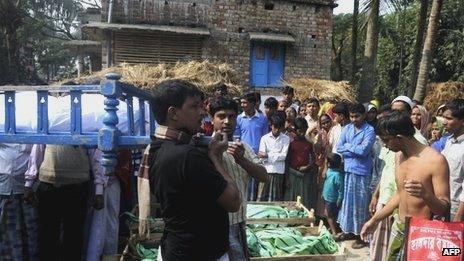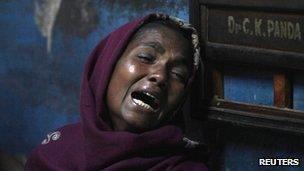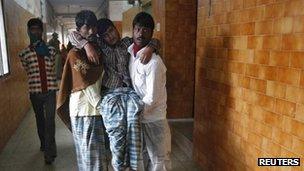Lives destroyed by a poisoned drink
- Published

Bodies are prepared for burial at a village near Diamond Harbour
Thirty-year-old Mafizur Jamadar worked in Calcutta.
He collected what people threw away and tried to sell it so that he could feed his family in the tiny village of Garijala.
He took the train from Calcutta to Sangrampur. Before heading home he went to one of the local illegal liquor dens to have a drink.
He paid 10 rupees (19 US cents) for a one-litre plastic bag filled with alcohol. It was the last drink he had.
The shop he bought it from has been smashed up.
Outside it there is still a large crowd. They are angry. One man tells me that the police take bribes and let them run these illegal drinking shacks.
Another says the main man behind the lucrative business has run away. He points to the police camp which is just in front of them. "What where they doing?" he asks.
These shacks are where India's poor come to drink. To try to forget their daily struggle to survive.
Grieving relatives
West Bengal's Chief Minister Mamata Banerjee has ordered an inquiry into what happened. She has also promised to shut down the illegal drinking dens. But few here think that anything will change.
Just a few kilometres down from Sangrampur is Mafizur's village.

Many were treated at Diamond Harbour but not all could be saved
It is a snapshot of the poverty of rural West Bengal. It has open sewers and the 200 families who reside here live in mud huts.
Three people have died here after drinking the toxic alcohol.
One of the bodies has just been buried among the bamboo trees. The women of this village are sat in a circle crying for those they have lost.
The lifeless body of Mazifur is in the middle, waiting to be buried.
He still has a hospital sticker with his name on his forehead. His mother is sitting with her grandson on her lap.
She said when he arrived home on Tuesday he had dinner and went to bed. On Wednesday morning when he woke up he was vomiting and feeling dizzy. They rushed him to the district hospital at Diamond Harbour. As his condition worsened, he was transferred to Calcutta. He died on the way.
He is one of many. More than 125 people have died and many more are in a critical condition.
Overwhelmed hospital
At the district hospital the corridor is lined with people fighting for their lives. Their saline drips are attached to the windows as there is not enough space for them.

Politicians vowed to close the drinking dens, but few think things will change
Ali Hasan Ullah is so weak that he can hardly speak. He is scared after seeing so many people die around him.
He tells me how he had a drink on Wednesday afternoon, almost 24 hours after the first deaths had been reported.
He is one of the many patients that Dr Saikat Kundu is treating here.
For the past few days he has had been working around the clock. Every hour, more and more patients are arriving at this hospital.
From what he has seen, he says that the symptoms point to methyl alcohol poisoning.
It must have been in large quantities as many patients died before they even reached the hospital.
He points outside to where the bodies are piled up in a small cart.
As I walk down the corridor there is a large crowd outside the office of the man in charge of this hospital, Chiranjit Murmu.
"We can't cope with the number of patients coming," he tells me. He says it is difficult to know what the exact numbers are because so many people died in the villages and their bodies have not yet been brought to the hospital.
Back in Garijala they are getting ready to bury Mafizur's body.
There are similar scenes in villages across this district.
The people who live here are among India's poorest.
The government has promised them compensation. But many here are sceptical as to whether they will ever receive it. For many, one drink has destroyed their lives.
- Published15 December 2011
- Published6 December 2011